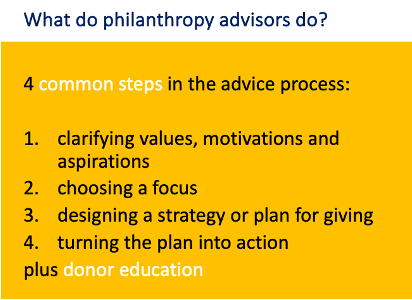By Emma Beeston
Have you ever met a Philanthropy Advisor?
Have you ever met a Philanthropy Advisor? Do you know what kind of person does this job, and what it is they do? Do you worry that their work impacts on what you are doing but can’t quite put your finger on how?
I am a Philanthropy Advisor.
This means a lot to me, and a small group of people in the philanthropy support ecosystem, but most people I meet do not have a clue what I do. Once when pitching for work, I was told they “already have a girl who does charity” and mostly I get surprise that this is an actual job and that people pay me. Deciding to write the book, Advising Philanthropists: principles and practice, with Professor Beth Breeze was in part waving the flag for me and all Philanthropy Advisors so that people would know that we exist and appreciate that our role matters.
Advising Philanthropists: principles and practice, was published a year ago, in Spring 2023. Our ambition was to increase the awareness and understanding of this little known, but needed and growing profession. In the book we cover the surprising history of philanthropy advising (did you know that celebrated novelist Charles Dickens also dabbled in philanthropy advising?), set out what it is Philanthropy Advisors do (for a twitteresque nutshell see Box 1), how they help, and our hopes for the future of this profession. It is an insider account drawing on interviews with 40 Philanthropy Advisors from 15 countries.

In my experience, philanthropy advising is deeply personal and emotional with clients exploring how much money is enough, what they want their legacy to be, and finding the best way to contribute to a world that is facing an overwhelming number of complex and intersecting issues. Philanthropy advising also takes place in the context of criticisms of wealthy donors and a range of debates on the role of philanthropy and the relative merits of different approaches. Because of this we wanted the book to go beyond topics like tax efficient giving and how to set up giving vehicles to engage with the challenges and ethical issues that arise when advising philanthropists.
“Being on the Philanthropic Studies MA programme really has been quite life changing. I found it challenging, rewarding and really the most wonderful experience.”
Delivered by distance learning, Kent’s MA Philanthropic Studies enables you to balance your professional development with your personal and work life. To find out more, email philanthropy@kent.ac.uk or visit our site now.
Coming out of the shadows
One year on, how did we do? And what has changed in philanthropy advice?
This was my first book and so I was very nervous when it was launched. I am delighted to report that our book was well-received. Beth and I have contributed articles, spoken at events, been interviewed for podcasts and shared our thoughts with many interested parties from community foundations to wealth managers. From this Autumn our book will be required reading on the American College of Financial Service’s Chartered Advisor in Philanthropy® course and it has been cited in books and reports in Switzerland, Australia and South Africa. I am particularly grateful for the feedback from those already practicing as Philanthropy Advisors such as this from Mitchell Spearman, a Texas-based Family Wealth and Legacy Coach: “Thank you for advancing our profession and for making “THE” guide for advisors to unlock philanthropy in meaningful ways.” This has helped me feel proud of my contribution and deal with my moments of imposter syndrome.
As we cover in the book, demonstrating the impact of a single intervention is hard to do. I am certainly not going to claim any attribution for our book. Instead, here are three pleasing developments since publication day that suggest Philanthropy Advice is developing as a profession:
- My google alert set for ‘philanthropy advice’ actually generates responses. In 2015 when I co-created the Advising Donors module at the University of Kent there was hardly anything to draw upon. Now there are an increasing number of mentions and articles and more openness in explaining what Philanthropy Advisors do, such as this piece from Erinn Andrews.
- Networks and training for Philanthropy Advisors have increased. P150, the global network of Philanthropy Advisors to clients who deploy more than $5m per year in philanthropic giving has doubled in size in 2023. New courses for advisors include the Institute of Private Philanthropy’s 4-month bootcamp for philanthropy executives and Daylight Advisors’ Prismatic Accelerator for BIPOC philanthropy advisor entrepreneurs. In the UK, there have been calls on the Financial Conduct Authority to make philanthropy advice mandatory training for financial and wealth advisors from both Pro Bono Economics and Onward Philanthropy.
- The strong case for the need for philanthropy advice continues to be made. For example, CAF’s Advising the Giving generation report highlighted that more than half of 18-34 year old high-net-worth clients want advice on their charitable giving but only 5% of advisors are ‘very confident’ discussing philanthropy. This was echoed in a CEG Insights report where a survey of 400 affluent investors found 87% wanted to make a meaningful impact through charitable activities but just 6% reported receiving charitable planning advice from their advisors.
The only constant is change
Of course, philanthropy itself has not sat still this past year. Philanthropists continue to be criticised and continue to be generous and to give in new ways – such as Marlene Engelhorn and David Clarke’s experiments with giving their money to others to allocate. There are debates around closing and sunsetting foundations, the rise of AI, random selection in grant-making, trust-based approaches, reparations, and how philanthropists should respond in conflicts, disasters and the climate crisis. This means working out how to give well has not got any easier and Philanthropy Advisors have got an even more important role in guiding donors through this complexity.
If it is true that imitation is the sincerest form of flattery, then perhaps the fact that fundraisers are now positioning themselves to sound more like Philanthropy Advisors means my profession is finally being recognised. Take this example from LinkedIn where a fundraiser describes themselves as “helping donors find meaning by connecting them with opportunities that reflect their values”. So perhaps it won’t be too long before I can introduce myself as a Philanthropy Advisor and not get a blank look and even better, might get this response: “thanks for helping encourage more and better philanthropy.”

